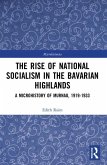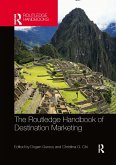The Rise of National Socialism in the Bavarian Highlands offers a microhistory of the town of Murnau between 1919 and 1933, a period which witnessed the rise of national socialism in Germany.
National socialism had its roots in Bavaria, where the Weimar Republic found it difficult to secure popular support amongst the rural population. It was in this region that economic hardship and effective national socialist propaganda furthered the erosion of democracy. Focusing on Murnau, this book examines the political and economic state of the town, as well as the mentality and social composition of its inhabitants. It also looks at the development of tourism in the interwar period, a topic which has received little scholarly attention. Although the study limits itself to one town, the reactions of its inhabitants reflect a common attitude of nostalgia for a seemingly better past and a rejection of the 'excessive' demands of modernity that the Weimar Republic exacted on them.
This book will appeal to scholars and students of national socialism, as well as those interested in the Weimer Republic, Nazi Germany, microhistory, and the history of tourism.
National socialism had its roots in Bavaria, where the Weimar Republic found it difficult to secure popular support amongst the rural population. It was in this region that economic hardship and effective national socialist propaganda furthered the erosion of democracy. Focusing on Murnau, this book examines the political and economic state of the town, as well as the mentality and social composition of its inhabitants. It also looks at the development of tourism in the interwar period, a topic which has received little scholarly attention. Although the study limits itself to one town, the reactions of its inhabitants reflect a common attitude of nostalgia for a seemingly better past and a rejection of the 'excessive' demands of modernity that the Weimar Republic exacted on them.
This book will appeal to scholars and students of national socialism, as well as those interested in the Weimer Republic, Nazi Germany, microhistory, and the history of tourism.








